Taking the temperature in the heart of Brexit land

Reporting from Hornchurch, England — It is nearly three years since Britain voted to leave the European Union in a referendum that left the country bruised, weary and bitterly divided.
Prime Minister Theresa May repeatedly vowed to lead the country out of its decades-long membership in the 28-member bloc and into a bright, prosperous future.
March 29 was set as the date for Britain formally departing the EU.
But after months of seemingly endless negotiations and political debate, the withdrawal agreement signed by May and her EU counterparts has been resoundingly rejected three times by British lawmakers unable to reach consensus on the nuts and bolts of Brexit.
With British elected officials hopelessly deadlocked, EU leaders agreed this month to grant a six-month extension until Oct. 31.
Many of the 16.1 million people who voted to remain in the EU rejoiced, as it opened a small window of hope that Brexit might never actually kick in.
But many of the 17.4 million people who voted in favor of leaving insist their voices are being ignored.
We went to the Brexit heartland of Hornchurch, a suburb in East London, which recorded one of the largest leave votes in the country in the June 2016 Brexit vote.
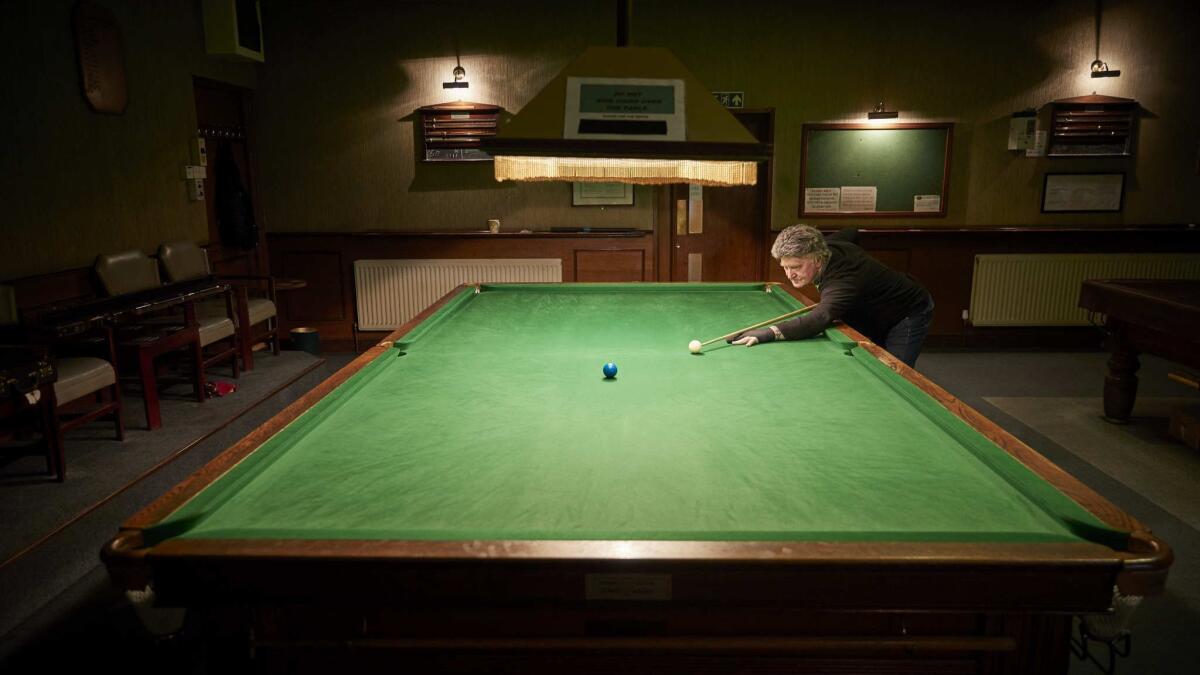
Retiree Tony Gilligan, 76
Gilligan returned to Britain shortly before the Brexit referendum after having resided in Australia for two decades. He feels dismayed and angry that local hospitals and police stations have shuttered due to funding shortfalls and youngsters are unable to find jobs after finishing or leaving school.
He says he voted to leave the EU because he wanted Britain to reassert control over its future. “We have always run ourselves. We dictate, we don’t get dictated to,” he said. “It’s made us a laughingstock when we were ‘Great Britain’.”
Gilligan lays the blame for the chaos firmly at the feet of elected officials. “I blame the idiots in Parliament that are arguing over everything instead of running our country like they’re supposed to be,” he said. “What a balls-up this is. I can’t believe that a bunch of so-called adults who are supposedly running Great Britain have made this look like a John Cleese comedy show.”
He feels Britain should have left on March 29 with or without a deal. He thinks Brexit will keep getting delayed and doesn’t understand how there can now be calls for a second referendum. “That’s a slap in the face for the people -- they have already voted,” he said. “They marched in the streets saying, ‘Do what we asked you.’ You brought the vote to us, we voted, now you are reneging on the vote? If we keep having referendums, when will it stop -- best of three? Five?”
Gilligan says he was thrilled when the original referendum results were announced. But now he questions if Brexit will happen at all. “It’s just becoming a joke to the rest of the world,” he said.
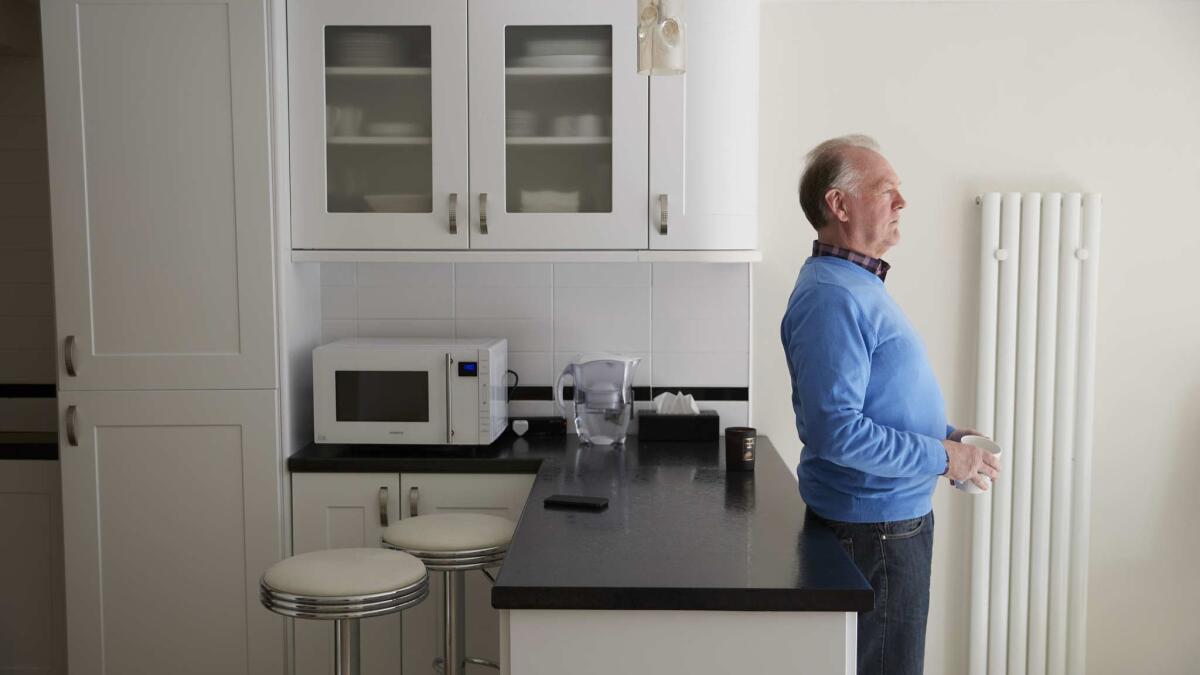
Councilman Graham Williamson
Williamson, a local elected official, wonders if street protests are on the horizon. He wants national lawmakers to understand that the 52% of voters who chose to leave the EU will not sit idly by if there are endless delays. “We need to turn on the establishment and in the short term, have some sort of civil disobedience,” he said.
He rejects the argument that those who voted to leave didn’t fully comprehend the implications. “They said [we voted to leave] because we were too stupid or didn’t know what we were voting for,” he said. “Most people I know and speak to say we voted on the issue of sovereignty because we believe in Britain as a country.”
Williamson would happily see Britain leave the European Union without any deal. He believes a whole new system of government should be introduced in Britain. “I think we need proportional representation, the Swiss model of government or some form of it,” he said. “In the long term obviously we don’t know what will happen. Ultimately we might get Brexit of a kind,” he added, referring to the belief that only a watered-down, softer deal that still keeps Britain closely tied to the EU could pass through Parliament. But he hopes that if that happens, Brexit “could be hardened up in the future.”
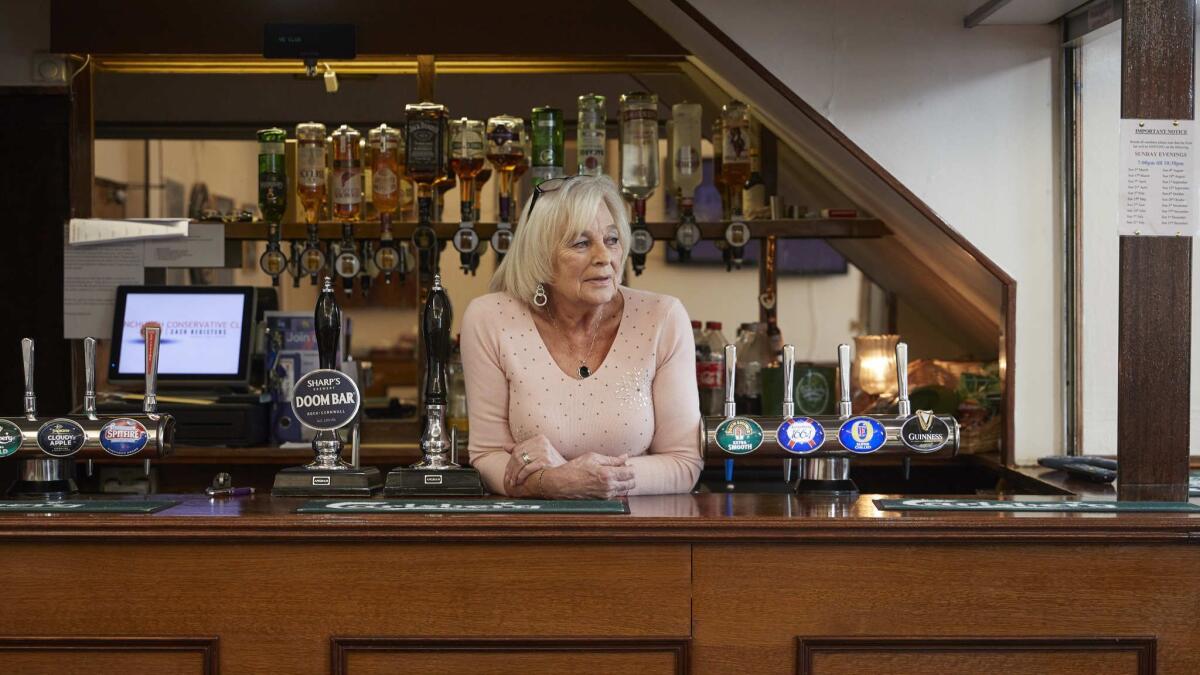
Bartender Joann Peake, 78
Peake says she is “embarrassed on behalf of our country.”
“We are making ourselves look like idiots. We are allowing another country to tell us how to conduct our life when this isn’t what it should all be about. People went to war twice so we could have freedom of speech.”
She also doesn’t like the idea of migrants from elsewhere in the EU using Britain’s welfare and health system too extensively. “It’s impacting on our life now,” she said, “because the National Health Service is in dire straits because there are too many people, and too many of them not paying into the system.”
Those calling for a second referendum say that voters were only asked if they wanted to leave or remain in the EU, and didn’t yet know what the withdrawal agreement would look like. Now that a deal has been negotiated, people should be given an opportunity to vote again, they say. Peake disagrees. She says she knew exactly what she was voting for --- to take back control of the country -- and thought it would happen immediately: “I was chuffed,” she said. “I thought it was going to happen there and then.”
Peake feels disillusioned that the negotiations have stalled..“There is all this dithering and pandering to the remainers,” she said. “Nobody is listening to us and to be quite honest it’s becoming a boring subject because it doesn’t change.”
If there was another vote on membership in the EU, Peake said she is unsure whether she would bother casting a ballot. “I don’t know if it would make any difference,” she said.
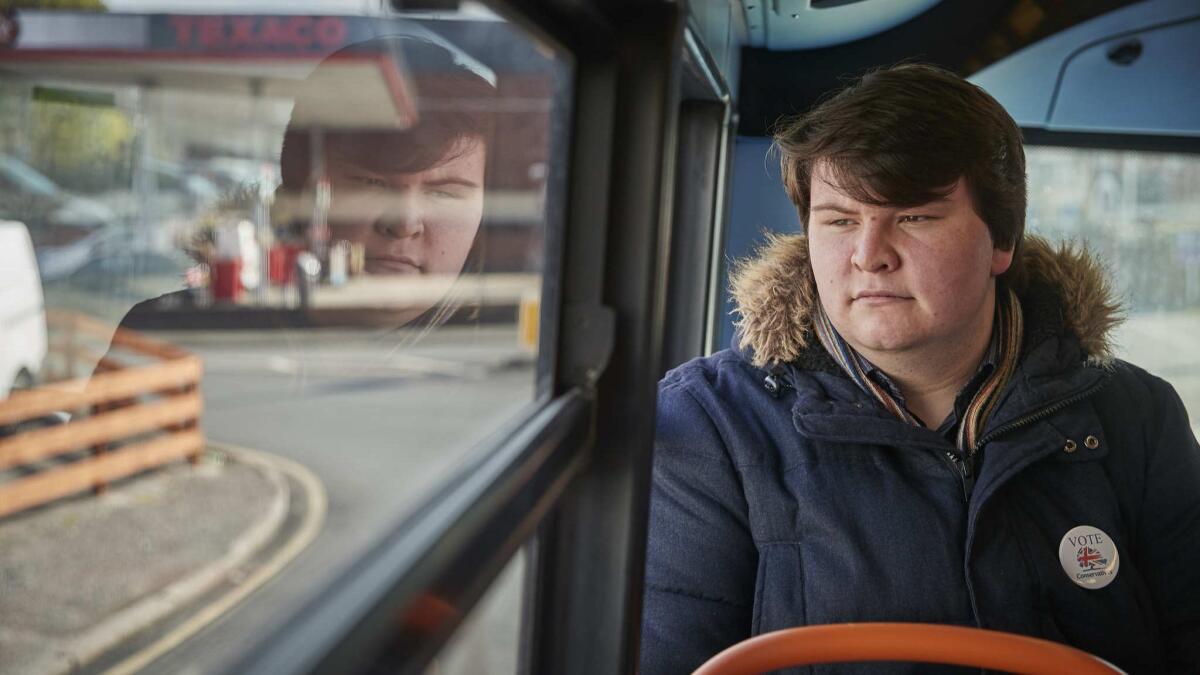
Student Grant MacMaster, 18
MacMaster was too young to vote in the 2016 referendum but, given the chance, would have cast a ballot to remain in the EU.
Yet now that he is eligible to vote, if there was a second referendum, he said, he would vote to leave. “I think the results should be delivered.”
MacMaster is from a family of remainers and felt upset at the time the results were announced.
“My immediate reaction was surprise,” he said. “‘Oh, we voted to leave.’”
MacMaster says his shift was inspired by Theresa May becoming prime minister. He was among those outside Downing Street when it was announced and joined the Conservative Party soon after.
MacMaster knows his politics are not really aligned with the majority of young people in Britain. According to YouGov polling data, 75% of 18- to 24-year-olds voted to remain in the EU.
“There’s a stigma over being a Conservative, even long before Brexit,” he said, but stands firm in his beliefs.
MacMaster would like to see Brexit resolved swiftly so the Conservative Party can tackle other pressing issues. “Brexit has tried the system, but it won’t break the system,” he said. “I think we need to focus on getting Brexit done then have consensus within the Conservative Party about domestic policy.”
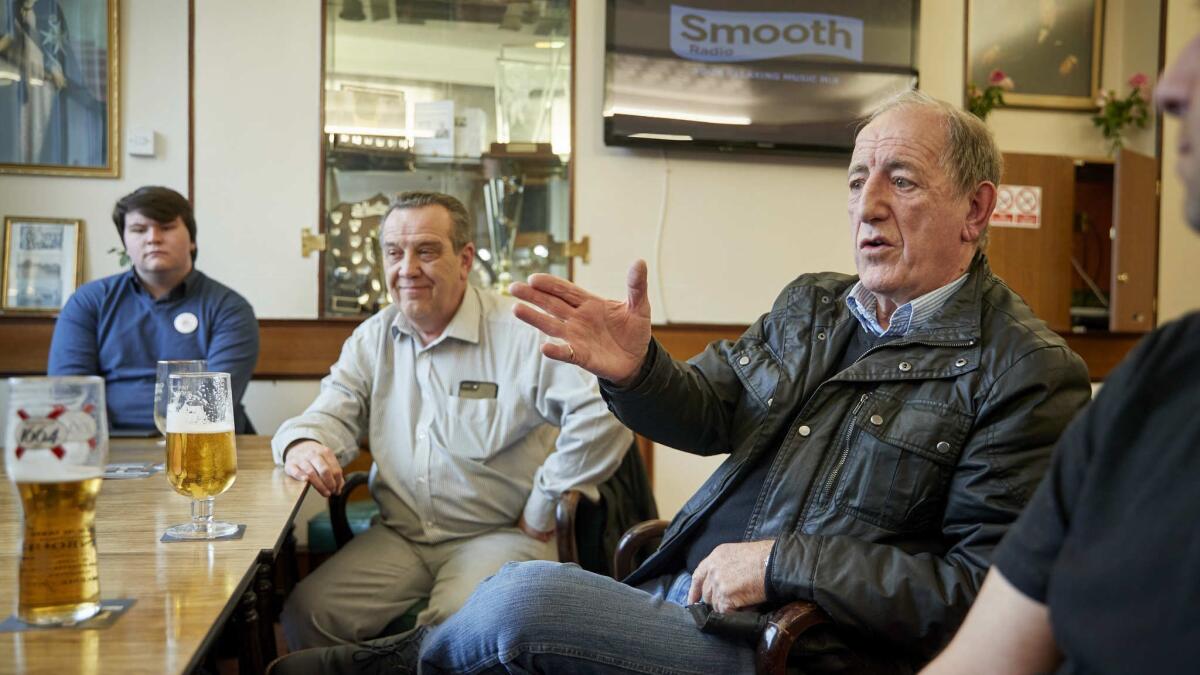
Keith Wells, president of the Hornchurch and Upminster Conservative Assn.
Wells has been a member of the Conservative Party for 40 years. When the Brexit vote was delayed by six months, he almost tore up his membership card in disgust. “I’m really frustrated to the extent that I’m willing to take action elsewhere,” he said. “If it means demonstrating, I will demonstrate.”
Wells believes May should have stuck to her promise to lead the country out of the EU on March 29 -- with or without a deal -- and feels deeply let down.
He didn’t mind Britain joining the Common Market in 1973, he said, but is unhappy with the way the relationship evolved. “We don’t want a Republican state of Europe,” he said. “We give more into Europe than we receive back. It’s Europe who is going to be the big loser, but still we hear doom and gloom.”
Immigration was another reason why Wells voted to leave. He worked overseas during his career and needed a visa. He doesn’t understand why that same system can’t be applied to Britain. “I’m not against immigration but too many people come to this country,” he said. “The floodgates have been opened by past governments. We gave everybody everything and we can’t blame people for wanting to come here.
“We need people who can participate in keeping Britain great,” he added. “Brexit would have helped us to do that. We would have got our borders back.”
Given the infighting, indecision and delays, Wells is unsure if Brexit will actually happen. If it drags on indeterminately, he has a plan: “I would go away to Europe and just enjoy myself. I would be giving up my political beliefs. I would just be going away, living and enjoying.”
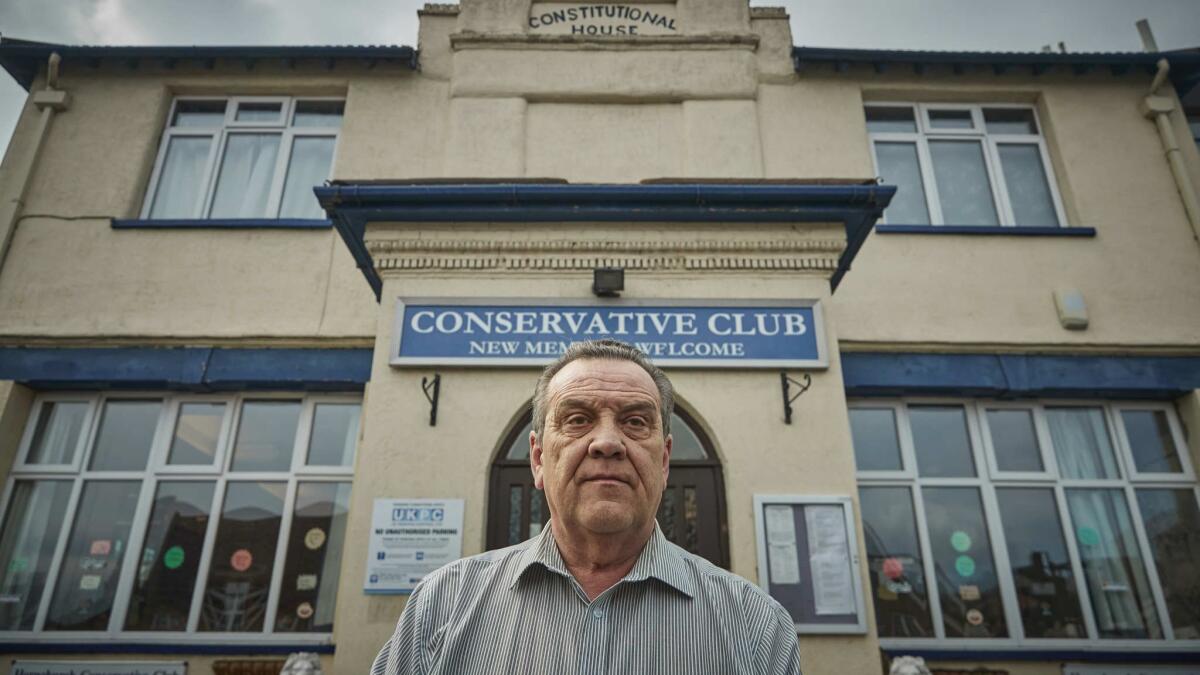
Robert Perry, ran the Vote Leave campaign in Hornchurch in 2016 and is deputy chairman of the Hornchurch and Upminster Conservative Assn.
Perry didn’t like any British laws coming under the jurisdiction of the EU, an institution he sees as a foreign power, and now feels betrayed by his Conservative Party for failing to deliver on Brexit. In fact, his belief in national politics is waning. “If the Brexit we voted for isn’t delivered, I don’t think I would have faith in this party anymore,” he said. “I think I would walk away.
“It fills me with sadness to actually feel that way. A party I have loved and supported all my life.”
He thinks that regardless of who voted leave or remain, the public has been totally messed about by the politicians. “The country has been shafted,” he said. “If we had Trump, he would have said: ‘Take it or leave it.’ I wish we had Trump right now.”
Perry doesn’t believe Brexit is actually going to happen at all anymore and feels insulted and belittled by remainers who argue that Brexiteers didn’t know what they were voting for. “For me it was sovereignty. Although immigration has to be controlled.”
His prediction for the future is bleak: more extensions of the Brexit deadline and “threats and bullying” by EU leaders and remainers. “We did not vote for a deal. We voted to leave,” he said. “The experts that are telling us we will suffer financial Armageddon if we leave Europe are the same that said we will go bust if we didn’t join the euro.”
Perry Horton, 58, owner of Al’s Pie and Mash
In a community where 70% of residents voted to leave the EU, Horton is a rare Hornchurch voice for remaining.
It wasn’t an easy choice or one he felt certain about, he said. He had concerns about immigration control, given that people can move freely between all 28 EU countries to live or work. But he was more concerned about what Brexit would mean for his business, a pie shop that was established by his father in 1964. “The people I’m influenced by are people I look up to business-wise, like [magnates] Alan Sugar or Richard Branson. I thought if they are all voting for remain, listen to what they are saying and why they’re saying it.”
He believes the country would be more stable if Britain had voted to remain. The price of produce increased nearly instantly, he said, and the pound has fluctuated wildly. But the vote is over and he believes the public is losing interest in the debate. “For at least one year, people coming in here spoke about it a lot. Not anymore,” he said. “It’s been a complete and absolute waste of time. There’s more information out there but there’s more confusion.”
Consequently, he is adamantly opposed to a second referendum. “What’s the point in doing it again? Would we then just turn the results over or do best of three?”
Some potential scenarios for Britain and the European Union after Brexit plan’s crushing defeat »
More to Read
Sign up for Essential California
The most important California stories and recommendations in your inbox every morning.
You may occasionally receive promotional content from the Los Angeles Times.










